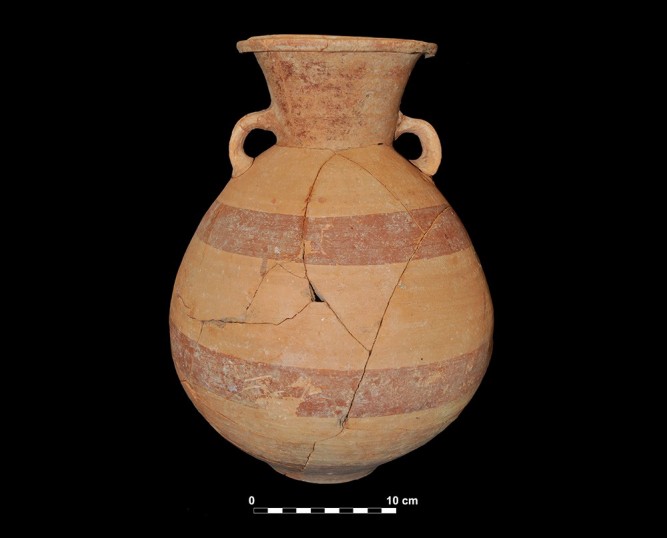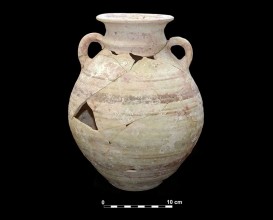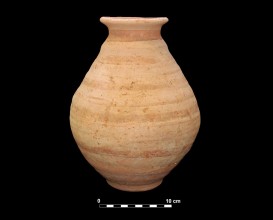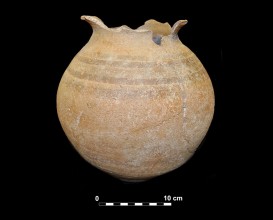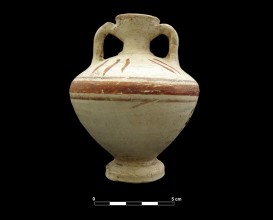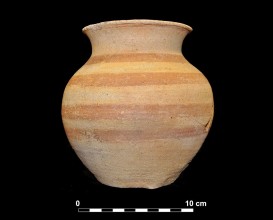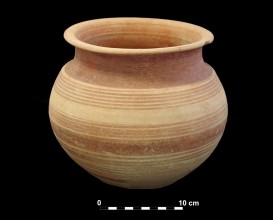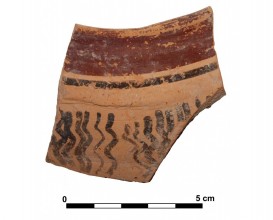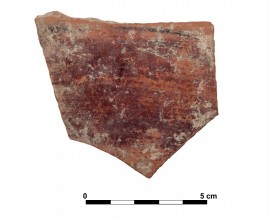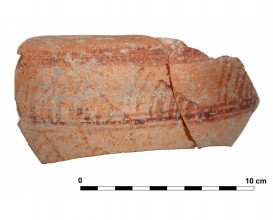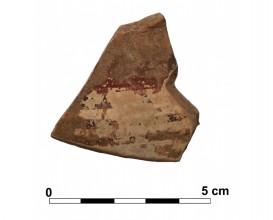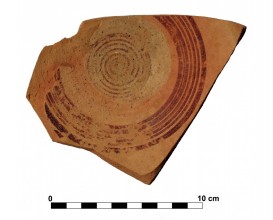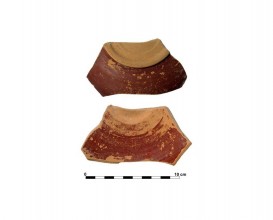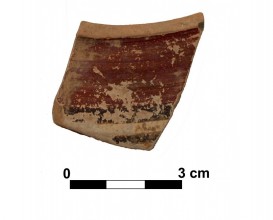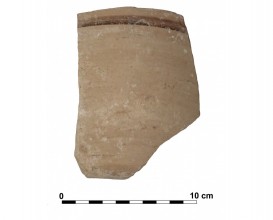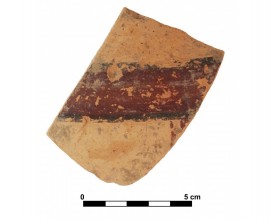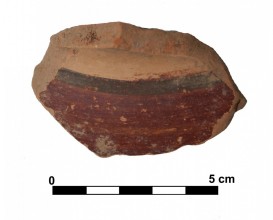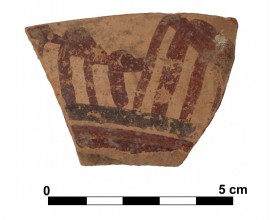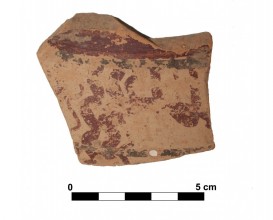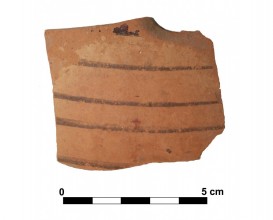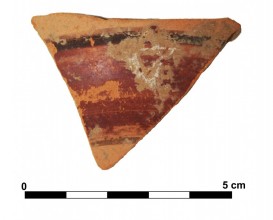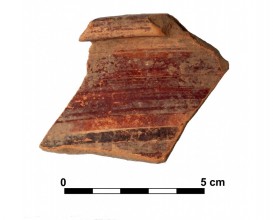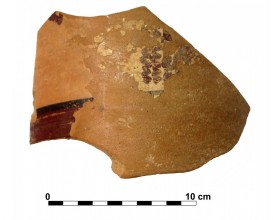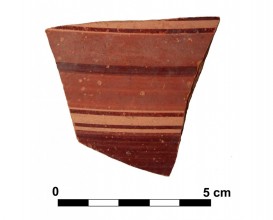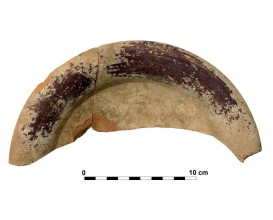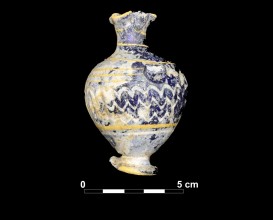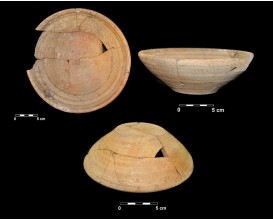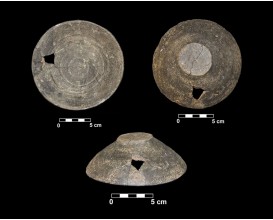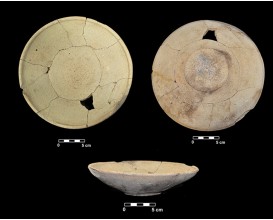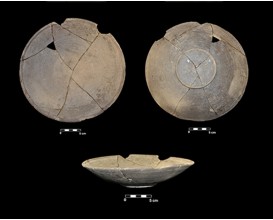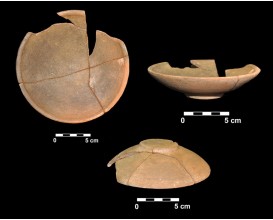Ceramic vessel 207. Grave 271. Cemetery of La Noria.
Dimensions
: 32.5 Centimeters
: 25 Centimeters
Materials
pottery
Temporal
: Iberians, Iberian
: Late 5th ct. BC-early 4th ct. BC
Spatial
: Cemetery of La Noria
: Fuente de Piedra, Málaga, Spain
: WGS84
Copyrights
Creative Commons - Attribution, Non-Commercial, No Derivatives (BY-NC-ND)
References
Andrino, M., Sánchez, P. J., Cumpían, A. y López, S. (2008):“Una necrópolis de incineración de las etapas iniciales de la Edad del Hierro en la comarca de Antequera. Resultados de la intervención arqueológica de urgencia en la parcela ur-6, Fuente de Piedra, Málaga”. Varia, 9. 359-378.
Ruiz, A., Molinos, M., Perez, Mª F., Montes, E. y Ortuño, E. (2018): "El túmulo C de la Necrópolis de la Noria (Fuente de Piedra). La tumba de las dos mujeres". Catálogo de la exposición La Dama, el Príncipe, el Héroe y la Diosa. Junta de Andalucía. 19-28.
Digital Resources
-

Creative Commons - Attribution, Non-Commercial, No Derivatives (BY-NC-ND)
Arquiberlab
http://creativecommons.org/licenses/by-nc-nd/3.0/ -
 Instituto Universitario de Investigación en Arqueología Ibérica
Instituto Universitario de Investigación en Arqueología Ibérica Creative Commons - Attribution, Non-Commercial, No Derivatives (BY-NC-ND)
Arquiberlab
http://creativecommons.org/licenses/by-nc-nd/3.0/ - Instituto Universitario de Investigación en Arqueología Ibérica
Creative Commons - Attribution, Non-Commercial, No Derivatives (BY-NC-ND)
Arquiberlab
http://creativecommons.org/licenses/by-nc-nd/3.0/ - Instituto Universitario de Investigación en Arqueología Ibérica
Creative Commons - Attribution, Non-Commercial, No Derivatives (BY-NC-ND)
Arquiberlab
http://creativecommons.org/licenses/by-nc-nd/3.0/ -
 Instituto Universitario de Investigación en Arqueología Ibérica
Instituto Universitario de Investigación en Arqueología Ibérica Creative Commons - Attribution, Non-Commercial, No Derivatives (BY-NC-ND)
Arquiberlab
http://creativecommons.org/licenses/by-nc-nd/3.0/ - Instituto Universitario de Investigación en Arqueología Ibérica
Pdf file
Creative Commons - Attribution, Non-Commercial, No Derivatives (BY-NC-ND)
Arquiberlab
http://creativecommons.org/licenses/by-nc-nd/3.0/ -

Creative Commons - Attribution, Non-Commercial, No Derivatives (BY-NC-ND)
Arquiberlab
http://creativecommons.org/licenses/by-nc-nd/3.0/
Activities
Archaeometric analysis Physical-chemical analysis Ceramic. Analysis of decoration.
| |
Raman Microscopy Mineral analysis of the red decoration. Non destructive. Surface cleaning. Sample pretreatment is not required. Direct measurement. Micro-Raman Spectroscopy (MRS) Portable equipment: BWS445-785S innoRam™ Raman spectrometer (B%26WTEK, Inc., Newark, USA) with a 785 nm excitation laser (maximum power of 300 mW) and a 4.5 cm-1 spectral resolution. The Raman microprobe can be mounted on a tripod with motorized XYZ axis (MICROBEAM S.A, Barcelona, Spain) or on a microscope sampling stage (B%26WTEK, Inc., Newark, USA). | |
X-Ray Fluorescence Elemental analyis of the red decoration Non destructive. Surface cleaning. Sample pretreatment is not required. Direct measurement.; Energy dispersive X- ray fluorescence (EDXRF) EDAX (model Eagle III) fluorescence spectrometer (CITI, University of Seville). This spectrometer is equipped with a microfocus X-ray tube with an Rh anode, a polycapillary lens for X-ray focussing, and an 80 mm2 energy dispersive Si-(Li) detector. The sample chamber incorporates an XYZ motorized stage for sample positioning. A high resolution microscope is used to position the sample on the desired distance from the polycapillary. To increase the sensitivity of the low Z elements, the sample chamber can be brought under vacuum. For the analysis of the samples, a spot size of 300 μm was chosen at an operating X-ray tube voltage of 40 kV. The tube current was adapted for each sample in order to optimise the detection of X-rays |

